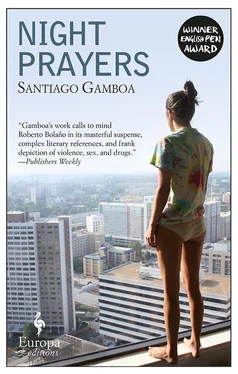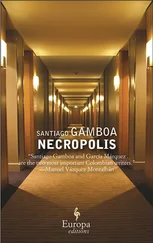Five days later, I left my home forever.
I said goodbye to Father, who was in the dining room underlining and analyzing the newspaper, which he did every morning before going to work. I put my hand on his shoulder and said, goodbye, Dad, look after yourself. He looked at me for a moment, a little surprised, but didn’t say anything; then I waved goodbye to Mother, who barely responded, just lifted her chin slightly.
By ten, I was at the airport. The flight to São Paulo wasn’t leaving until past noon. The former Miss Colombia and her friend went with me as far as Immigration. In the Juan Valdez Café, before boarding, the man gave me an envelope with five thousand dollars, which I put in my jacket. I already had a list with the telephone numbers and names I had to contact, and in any case, they said, someone would be waiting for me at the airport. In Bangkok I would spend a couple of days making those contacts. Once that was done, and everything was ready, I would go to Tokyo for a week to look for my sister. Then I would go back to Bangkok to pick up the merchandise and make the return journey to Colombia. They agreed that, in that way, I would arouse less suspicion. It was a simple plan.
My secret plan was different: once I found Juana in Japan, I’d get lost. Nothing else mattered to me anymore.
They went with me to the international departures entrance and said goodbye with big hugs, as if they were my parents. I was trembling slightly as I walked to Immigration.
I was leaving Bogotá, leaving Colombia. I couldn’t believe it.
The Immigration officer asked me a routine question, where are you traveling to? São Paulo, I replied, showing my boarding pass. He stamped my passport. I passed through baggage check, where they searched me a couple of times. I went into the duty-free shop. Then I sat down in the departure lounge and looked at the other passengers, the hustle and bustle, the rush.
When I got on the plane everything was new. They gave me a window seat, just behind the wing. Was I nervous? Yes, a little. The movie of my whole life passed through my mind, the way they say it happens when you’re about to die. Next to me sat a young Brazilian girl with an iPod. She smelled good and was very beautiful. When she leaned forward she revealed the top half of her tanned ass. She asked me if I was going to Brazil on vacation. A few moments later, the plane started moving and taxied to the runway. It gathered speed and I sank into my seat. I felt a strange pleasure and a second later saw my hated city from above.
Poor, wretched Bogotá, I thought, I’m never going to see you again.
The plane did a number of turns until I lost sight of it. I felt something strange running down my cheeks. I was crying again.
I crossed the world. I flew over the Amazon and the Atlantic. I passed over Africa and reached the Persian Gulf. Then Asia Minor, India, and finally, the Malay Peninsula and my first destination, Thailand.
At Bangkok airport I was absolutely determined to get away from the former Miss Colombia and her partner, so once I’d collected my baggage, I slipped away through the crowd, hailed a taxi, and went to a hotel that I had chosen over the Internet with that in mind. It wasn’t the one they had booked for me and I thought that this way I could evade them. To avoid upsets, I stayed in my room after registering. The plan was not to go out until three days had passed, during which time I would wait before carrying on to Tokyo.
I’m not naive, I knew they would look for me and raise the alarm. The only thing I could do was remain hidden, not move, and each day would be a small triumph. The first one was like that. There were no strange movements. That night, I went down and ate in the cafeteria and didn’t see anything threatening, although the service people looked at me with strange expressions. Twelve thousand miles from my city, everything was bound to be strange, I told myself. The second day was the same, and I ventured outside. To be on the safe side, I took the money, the passport, and the ticket with me. If they came to my room they could keep everything, nothing that was in the case mattered to me. I went down to the river and crossed it in a canoe. I saw the skyline of the city in the sunset and it struck me as sad. The river was sad too, as if it was carrying along with it something that never get completely clean, as if it was running through a membrane that was about to burst painfully.
When night fell I had dinner in a restaurant that had a terrace over the Chao Phraya. I kept looking at it, hypnotized by that desolation. I should have listened to what it was telling me, but I couldn’t understand it. I got back to the hotel at eleven that night and lay down to sleep, thinking that the following day, very early, I would go to the airport. At six in the morning someone knocked at the door. I was scared and stayed in bed, hoping they would go away, which was highly unlikely. They knocked more loudly and I got up and looked through the peephole. They were police officers and that calmed me down. I opened the door and asked what was going on, but instead of answering they pushed me with my face against the wall. Then they handcuffed me and took me out into the corridor.
They brought me here and the rest you know. They found those pills in my case, but they weren’t mine, I didn’t put them there. I was trying to escape and they caught me, and that was the punishment. The police know that. I haven’t committed any crime.
Manuel stopped speaking and sat there in silence, in the darkest corner of his cell. I supposed it was the first time he had spoken so much, the first time he had told his life story in such an extensive and desperate way. It was clear to me that he wanted to save himself. That was the deep meaning of his story: a cry for help. Then he said:
“Consul, the reason I told you all this is because I want to ask you something. Find her for me. Go to Tokyo and bring back Juana. That may seem a lot to ask, but it’s my last request. Think of it as the final wish of a condemned man.”
I was silent for a moment, looking at him. In spite of everything, he still believed in something. He was barely twenty-seven years old, that must have been it. We soon forget our youth and what it entails. I noted down a few names. This wasn’t really my role, I was thinking, but I’d once written: “When you know the right thing to do, the hard thing is not to do it.” That phrase had acquired a new meaning, its eloquence was showing me the way, there in the hot, dirty air of Bangkwang.
I said yes, I would go and find her, but in return he had to plead guilty to save his life.
“If you find her, my life is hers,” Manuel said. “I’ll do whatever Juana says.”
When I left, it was pouring rain. Another of those tropical downpours that arrive suddenly and obscure the air. I refused the tea offered me by one of the prison trusties and walked back to my taxi. The driver was asleep in the backseat.
We returned to the city beneath columns of water and roaring clouds. The paddy fields glittered, illuminated by a slanting sun that came from another part of the sky. I went straight to see the lawyer, thanked him for arranging my visit, and again asked him to take personal charge of the case. As he spoke, I saw that he had an open book on the table. It was The History of Rome by Jules Michelet, in an English translation. Once again he had surprised me.
Noticing that I was looking at the book, he said:
“You know what I’ve always thought? It’s curious that your culture, Western culture, comes from that crazy empire, with its Caligulas and its Heliogabaluses. It’s no surprise that you’re living through such an incomprehensible era today.”
I looked at him with approval. I thought to say something but preferred to keep silent, now was not the time to start a historical discussion.
Читать дальше












